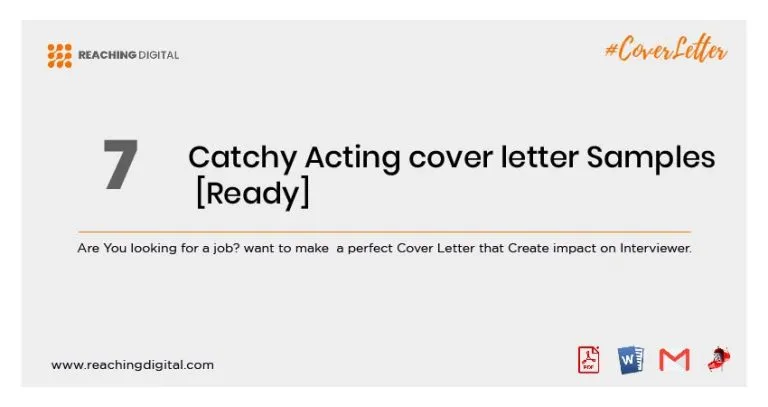Understanding the Importance of an Acting Cover Letter
In the competitive world of acting, a compelling cover letter is often your first impression. It’s your opportunity to introduce yourself, showcase your skills, and express your enthusiasm for a specific role or project. Think of it as your personal sales pitch, designed to grab the attention of casting directors and convince them that you’re the perfect fit. A well-crafted cover letter can significantly increase your chances of landing an audition, while a poorly written one can be an instant deal-breaker. This guide provides comprehensive instructions to help you write a cover letter that will set you apart and make you a standout among applicants. In today’s industry, a strong application is essential to be even considered. Follow these guidelines to create your perfect acting cover letter.
Why a Cover Letter Matters in Acting
A cover letter is more than just a formality; it is your first chance to make a connection with a casting director. It offers you a space to demonstrate personality, express your passion for acting, and explain why you are a suitable fit for the specific role. It goes above and beyond the information presented in your resume or headshot and allows you to provide context to your experience and highlight what makes you unique. It offers you the possibility of making the director remember you over other applications. This can be the determining factor in whether you receive an audition or not. Furthermore, cover letters also allows you to show your understanding of the project and your interest in the role, demonstrating that you’ve done your research and you’re genuinely interested.
Key Elements of an Effective Acting Cover Letter
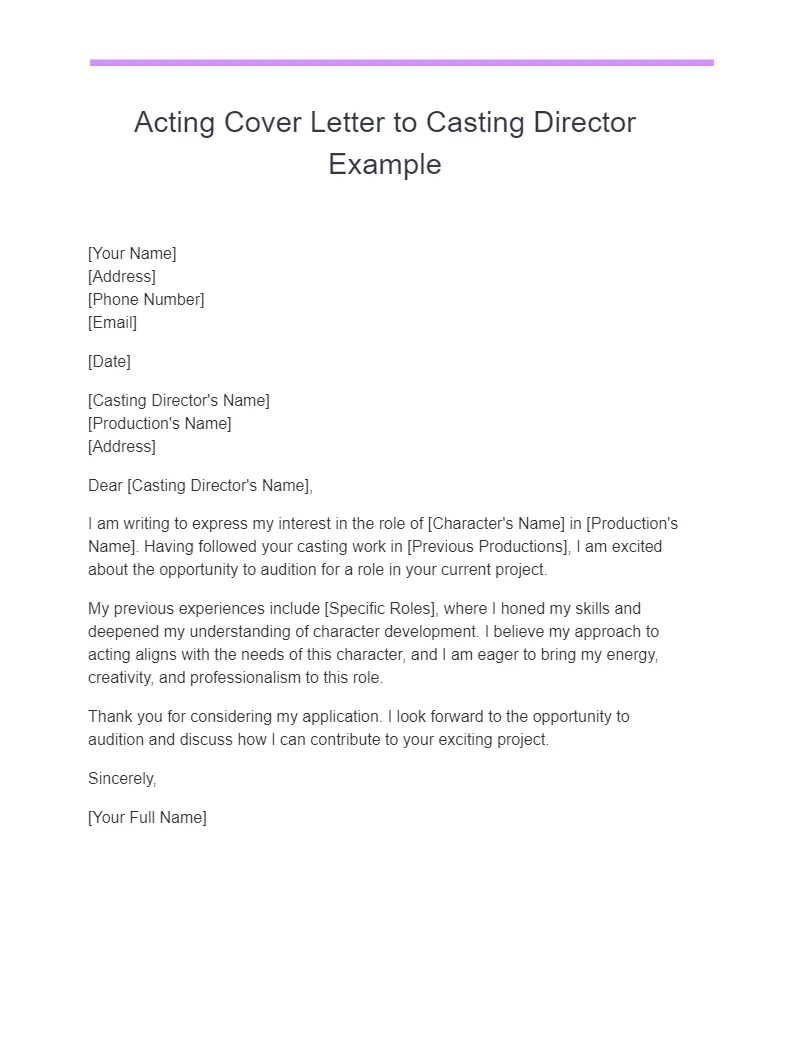
Header and Contact Information
Begin your cover letter with a professional header. Include your full name, phone number, email address, and the date. If you have an agent, include their contact information as well. Ensure your contact information is up-to-date and easy to find. This is vital because it is how the casting director or their team will reach you if they want to give you an audition. Make sure the formatting is clean and easy to read, so your contact details are easily accessible. For example, you can include your name, address, phone number, and email address in the header. This provides essential details for the casting team and makes it easy for them to reach out to you.
Professional Formatting Techniques
The format of your cover letter is as important as the content. Use a clear, easy-to-read font such as Times New Roman or Arial, with a font size of 11 or 12 points. Keep the letter concise, ideally no more than one page. Use standard business letter format with single-spaced text and a blank line between paragraphs. Properly format your letter so it is easy to read and organized. Use professional formatting to make a positive impression. Avoid excessive use of bolding, italics, or underlining. The goal is to present a polished and professional image of yourself as an actor. Remember to adjust your formatting to the casting director, sometimes formatting to the project requirements is ideal.
Crafting a Compelling Opening
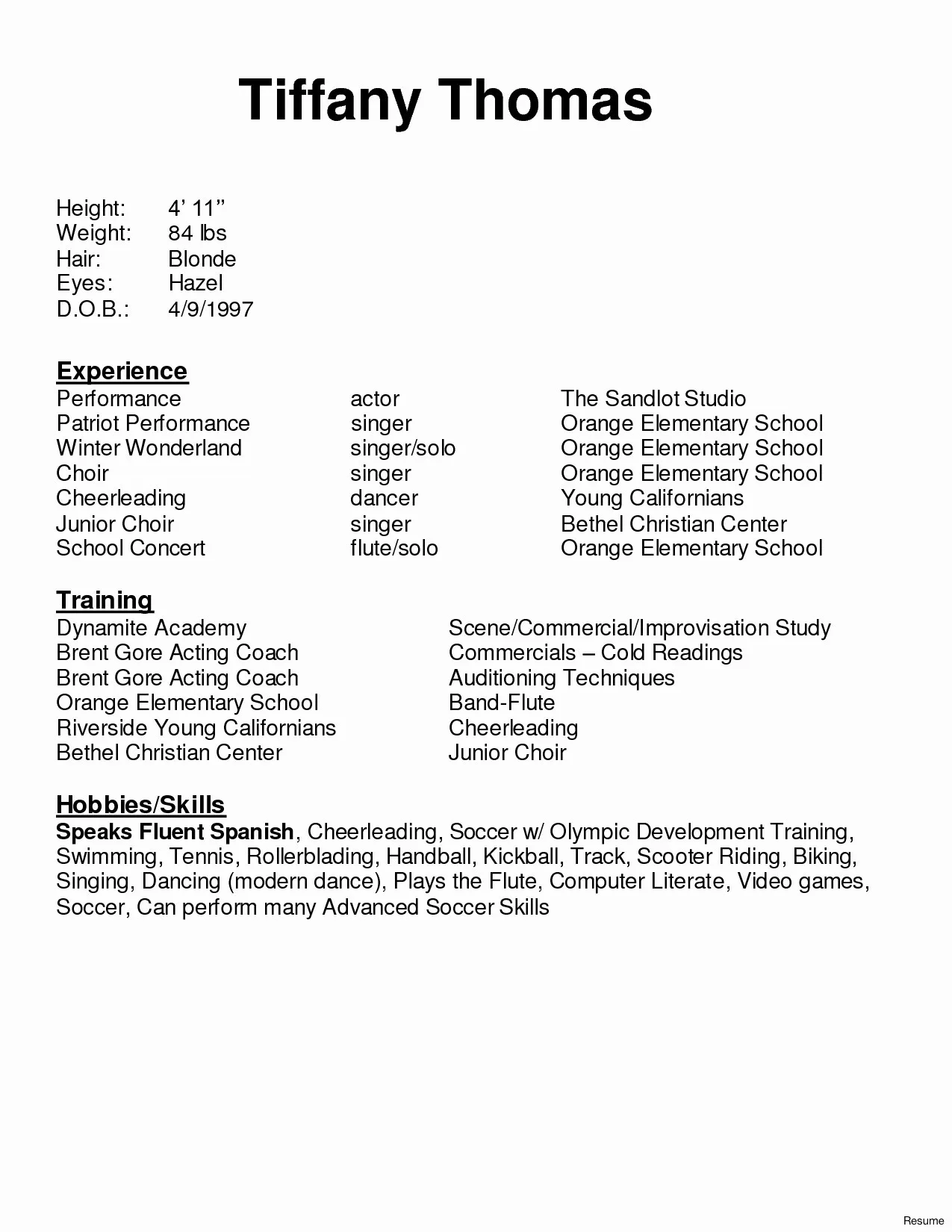
The opening of your cover letter is your opportunity to immediately grab the casting director’s attention. Start with a strong, attention-grabbing opening line. Personalize the letter by addressing the casting director or the production company by name, if possible. Clearly state the role you are applying for and how you learned about the opportunity. A compelling opening sets the tone for your entire letter and encourages the reader to continue. It is key to show interest and passion for the project from the first sentence, showing why you are excited by the prospect of the role. This could be by mentioning a specific aspect of the project that appeals to you or a connection you have to the material.
Grabbing the Casting Director’s Attention
To grab the casting director’s attention, highlight your unique qualities. Share a relevant anecdote or a brief story that showcases your personality and acting skills. Mention any specific skills or experiences that align with the role’s requirements. Use strong, active verbs and avoid clichés. Show, don’t just tell, what makes you the perfect actor for the role. Focus on what you bring to the table, and show the casting director why you would be an excellent choice. This is your chance to shine and make them want to learn more about you. Make sure the tone is still professional but it is also inviting and shows enthusiasm.
Showcasing Your Acting Experience
In the body of your letter, provide details about your acting experience. Briefly describe your previous roles, including the name of the project, the director, and the year of the production. Focus on the roles and projects that are most relevant to the role you’re applying for. Keep it concise and highlight your achievements. Mention any specific skills you used or challenges you overcame in these roles. This is your chance to illustrate your skills and experience and demonstrate your ability to take on the role. Don’t just list roles; provide context. Explain what you learned from each role and how it has contributed to your growth as an actor. Highlight the impact of your performances.
Highlighting Relevant Roles and Skills
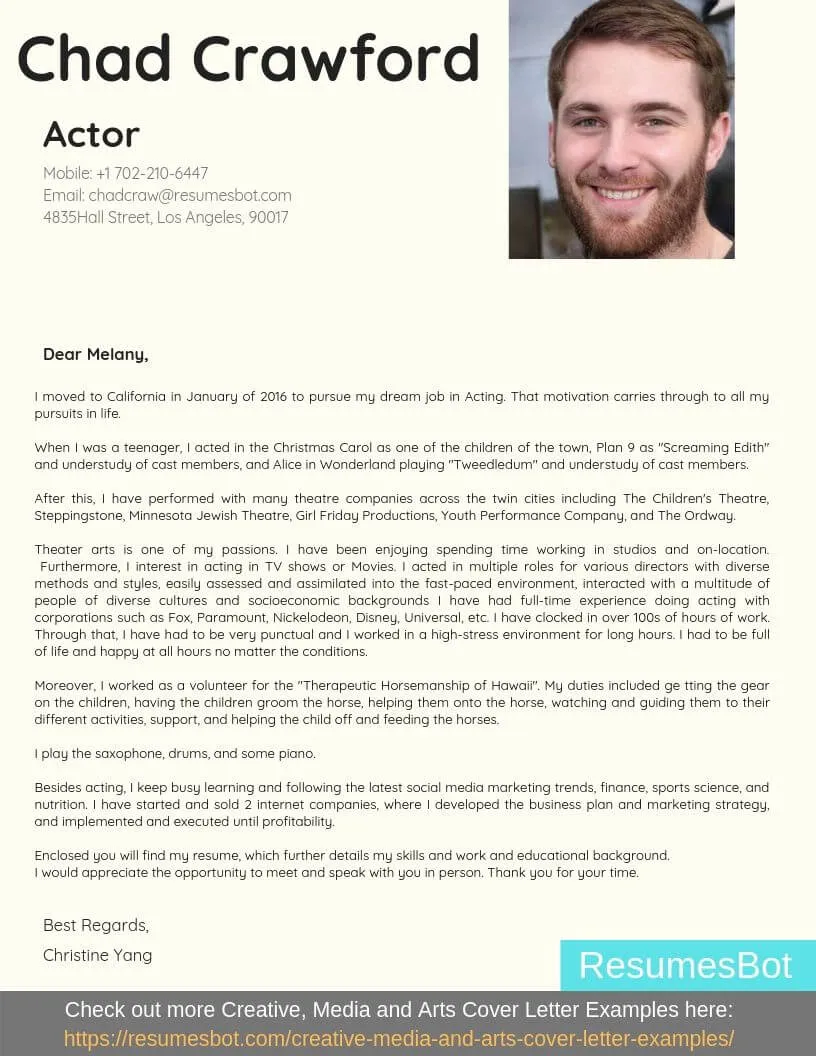
Carefully consider the requirements of the role and tailor your letter to match. Identify the skills and experiences that align with the casting director’s needs. Select a few key roles that demonstrate your ability to meet the requirements of the specific role. Highlight any specific skills, such as accents, dialects, physical abilities, or other relevant talents. When you align with the role requirements and focus on skills, you show the casting director that you understand the project and are the right fit. Don’t try to be everything to everyone. Focus on the skills and experience that are most valuable to the project at hand. Be specific and provide examples of your skills in action.
Quantifying Your Achievements
Whenever possible, quantify your achievements to demonstrate your success. Use numbers and data to make your accomplishments more impactful. For example, if you won an award, specify the award and the year. If you were a lead in a production that was a success, mention the audience numbers. Including hard data makes your claims more credible and compelling. It provides concrete evidence of your value and your ability to deliver results. This helps the casting director understand the scope and significance of your achievements. Show how your contributions had a positive impact on the project or organization.
Demonstrating Your Passion and Enthusiasm
Expressing your enthusiasm for acting is crucial. Show your passion for the specific project and the role. Mention what excites you about the project, the script, or the creative team. Demonstrating your enthusiasm makes you a more attractive candidate. This communicates that you will bring positive energy to the set. Your passion will resonate with the casting director and make them excited about your potential. Show that you are enthusiastic about being part of the team and contributing to the project’s success. This will convey your true appreciation for the opportunity.
Expressing Your Dedication to the Craft
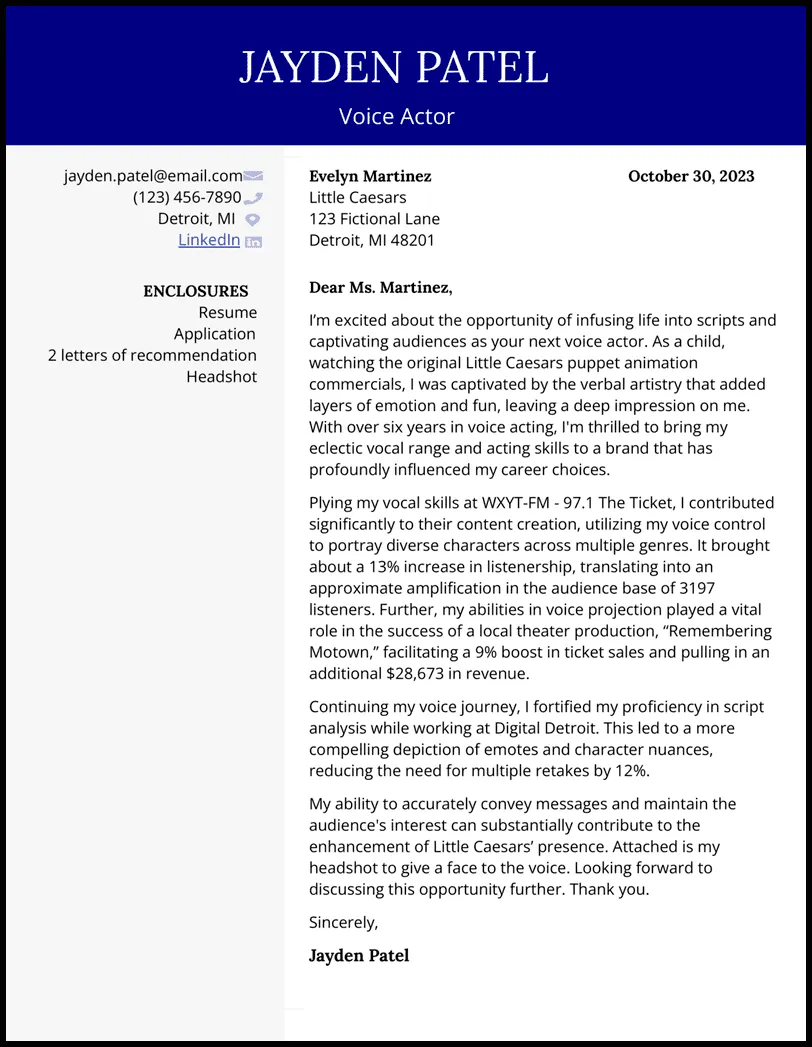
Show your commitment to your craft. Mention any recent workshops, classes, or training you have undertaken to improve your skills. Highlighting your dedication indicates that you are always striving to learn and grow as an actor. This shows that you are serious about your profession and willing to invest in yourself. This level of dedication will impress the casting director and make you a more competitive candidate. Your dedication is an important element to get more auditions and will help ensure you have a long and successful career in acting.
Tailoring Your Letter to the Role
A generic cover letter is a major red flag. Customize your letter to each specific role or project. Review the role’s requirements, the project description, and any other information provided. Highlight the relevant skills and experiences that align with the role. Show that you understand the role and the project’s needs. A tailored letter demonstrates that you’ve done your research and are genuinely interested in the opportunity. It will set you apart from the applicants. Be specific and include details from the role, to make sure you are a good fit.
Researching the Project and Casting Director
Before writing your cover letter, conduct thorough research on the project and the casting director. Understand the project’s background, genre, and style. Learn about the casting director’s previous work. This research will allow you to tailor your letter. This will show that you are serious about the opportunity. Referencing the casting director’s previous work in your letter shows that you’ve taken the initiative to understand their style and preferences. This can help your letter stand out. This can also help you determine if the casting director is the right fit for you. This will also help you understand the tone and style of the project, and you can adapt your letter accordingly.
Addressing Specific Requirements

Carefully review the job description and address each of the required qualifications. Mention any specific skills, experience, or other requirements. Provide examples of how you meet these requirements. If you do not meet all the requirements, address the gaps in your experience. Focus on transferable skills or other relevant experience. Be honest and straightforward and highlight your eagerness to learn. Make sure you clearly state how you fit the job profile by addressing each point. This demonstrates your commitment to the role. Show your ability to meet expectations and will showcase you as a strong contender.
Writing a Strong Closing
End your cover letter with a strong, memorable closing. Summarize your key qualifications and reiterate your interest in the role. Express your gratitude for the casting director’s time and consideration. Always end on a positive note. Your closing should leave a lasting impression. A great closing will increase your chances of getting an audition. Make sure it leaves them with something to remember. This is your final chance to make a positive impact. Conclude with a powerful statement that reinforces your enthusiasm and suitability for the role.
Reiterating Your Interest and Availability
In your closing, reiterate your interest in the role. Reiterate your availability for an audition and any potential callbacks. Express your excitement about the possibility of contributing to the project. This reaffirms your commitment. It also reminds the casting director of your enthusiasm for the role. Make sure that you are truly interested. Be clear about your availability and make it easy for the casting director to contact you. Make sure the information is concise and makes you look as professional as possible.
Including a Call to Action
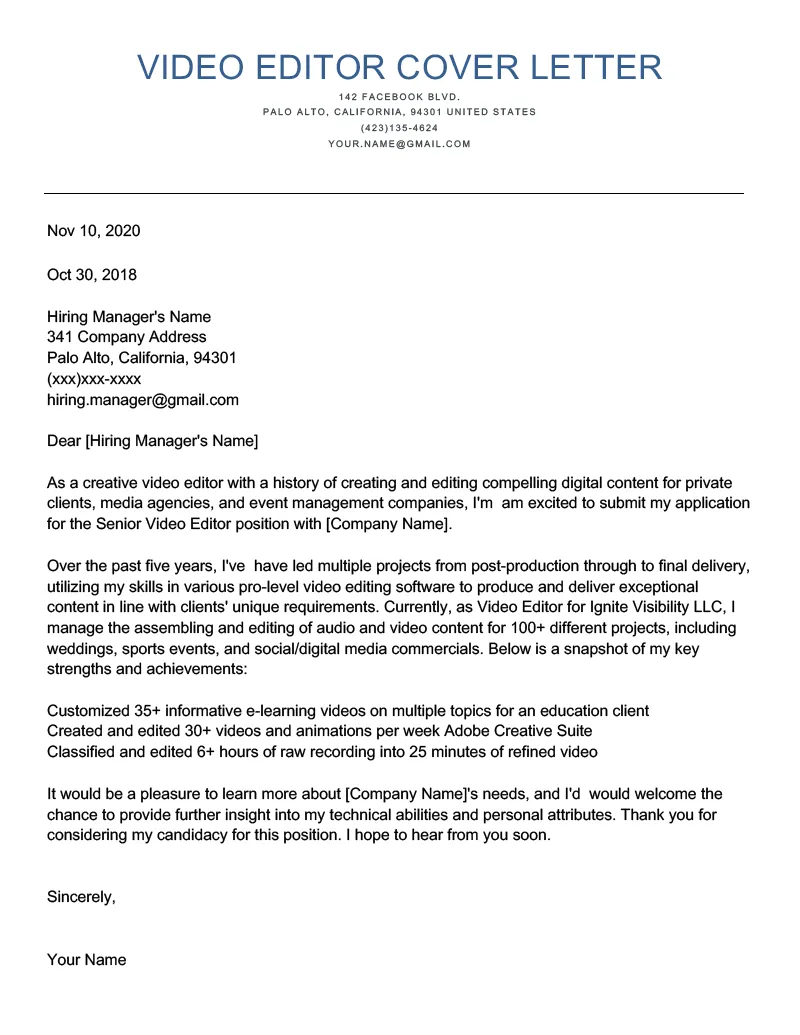
Include a call to action in your closing. Request an audition or an interview. Thank the casting director for their time and consideration. Make it easy for them to move forward. This direct approach shows confidence and initiative. It encourages the casting director to take the next step. Make sure your call to action is polite but assertive. Ensure that the call to action aligns with the role or production. This shows your willingness to go to the next stage. The call to action encourages a response. Make sure the casting director can contact you and know that you are truly interested.
Proofreading and Editing Your Cover Letter
Avoiding Common Mistakes
Avoid common mistakes that can undermine your cover letter. Don’t use generic templates. Tailor each letter to the specific role. Refrain from using clichés or overly dramatic language. Keep your tone professional and avoid being overly familiar or casual. Avoid any negative comments about other actors or previous projects. Focus on highlighting your strengths and qualifications. Take the time to make your letter unique. Avoid using the same cover letter for all applications. Each letter should be customized. Make sure it is not only tailored to the role but also represents who you are as an actor.
Formatting, Grammar, and Spelling Checks
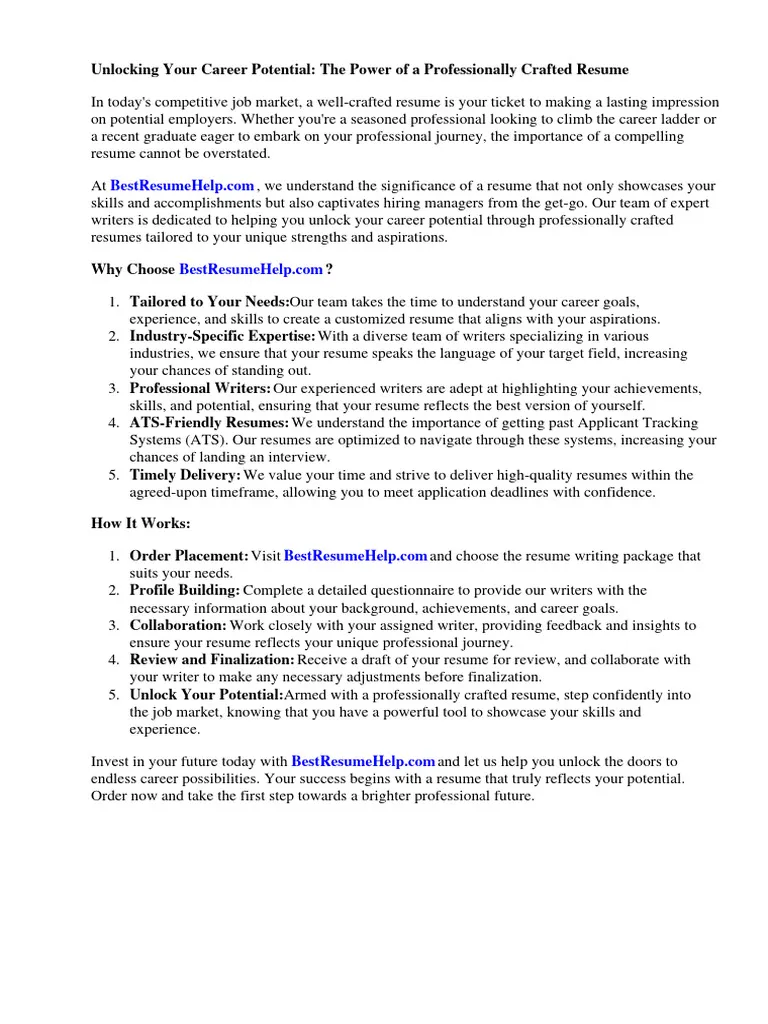
Thoroughly proofread your cover letter for any formatting errors. Check for grammatical errors, spelling mistakes, and typos. Use a grammar and spell-checking tool to catch any mistakes. Ask a friend or colleague to review your letter. A mistake-free cover letter demonstrates professionalism and attention to detail. Ensure that your formatting is consistent. It is also an indication of professionalism. A letter free from error sends a message about your attention to detail. Your cover letter shows the casting director you pay attention to detail. Proofread your cover letter to be sure that the tone is appropriate.
Using Professional Language and Tone
Maintain a professional tone throughout your cover letter. Use formal language and avoid slang. Express your enthusiasm and passion while remaining composed and respectful. Ensure your writing style is clear and concise. Avoid any overly casual or informal language. The tone should be appropriate for a professional setting. Ensure your writing style conveys your professionalism. Keep it professional while showing who you are as an actor. Use the appropriate language and tone. This shows the casting director that you understand the industry. A professional tone is key for a great acting cover letter.
